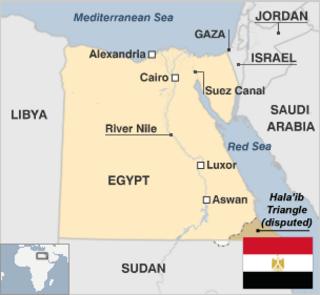Egypt country profile
Long known for its ancient civilisation, Egypt is the largest Arab country and has played a central role in Middle Eastern politics in modern times.
In the 1950s President Gamal Abdul Nasser pioneered Arab nationalism and the non-aligned movement, while his successor Anwar Sadat made peace with Israel and turned back to the West.
Egypt’s teeming cities – and almost all agricultural activity – are concentrated along the banks of the Nile, and on the river’s delta. Deserts occupy most of the country.
The economy depends heavily on agriculture, tourism, and cash remittances from Egyptians working abroad, mainly in Saudi Arabia and the Gulf countries.
However, rapid population growth and the limited amount of arable land are straining the country’s resources and economy, and political unrest has often paralysed government efforts to address the problems.
FACTS
Arab Republic of Egypt
Capital: Cairo
Population 83.9 million
Area 1 million sq km (386,874 sq miles)
Main language Arabic
Main religions Islam, Christianity
Life expectancy 72 years (men), 76 years (women)
Currency Egyptian Pound
LEADERS
President: Abdel Fattah al-Sisi
Retired Field Marshal Abdel Fattah al-Sisi was elected president in May 2014, almost a year after he removed his elected predecessor, the Muslim Brotherhood’s Mohammed Morsi, from office in a coup.
He had served as armed forced chief under Mr Morsi, and was a key figure in the interim government which took over after the ouster.
Some Egyptians celebrated the possibility that Mr Sisi would bring stability to a country in upheaval since the removal of long-term leader Hosni Mubarak during the Arab Spring uprising in 2011. Others worry that he represents a return to the authoritarian security state that prevailed under Mr Mubarak.
Mr Sisi won a second four-year-term in March 2018 against a sole minor opposition candidate. Human rights lawyer Khalid Ali and former prime minister Ahmad Shafiq withdrew from the race, and the former armed forces chief of staff Sami Anan was arrested.
In addition to Egypt’s struggling economy, President Sisi also has to deal with an Islamist insurgency on its borders with Israel and Gaza.
MEDIA
Egypt is a major regional media player. Its TV and film industries supply much of the Arab-speaking world with content and its press is influential.
TV is the favourite medium and there are several big hitters in the sector, including the state broadcaster.
The authorities have been increasing controls over traditional and social media to an unprecedented degree.
Reporters Without Borders says Egypt is “one of the world’s biggest prisons” for journalists.
Read full media profile
TIMELINE
Some key dates in Egypt’s history:
circa 3000 BC – Kingdoms of Upper and Lower Egypt unite. Successive dynasties witness flourishing trade, prosperity and the development of great cultural traditions.
332 BC – Alexander the Great, of ancient Macedonia, conquers Egypt, founds Alexandria. A Macedonian dynasty rules until 31 BC.
31 BC – Egypt comes under Roman rule. Queen Cleopatra commits suicide after Octavian’s army defeats her forces.
33 AD – Christianity comes to Egypt, and by 4th century has largely displaced the Egyptian religion.
4th-6th centuries – Roman province of Egypt becomes part of the Byzantine or eastern Roman Empire.
642 – Arab conquest of Egypt.
1517 – Egypt absorbed into the Turkish Ottoman empire.
1805 – Ottoman Albanian commander Muhammad Ali establishes dynasty that rules until 1952, although nominally part of the Ottoman Empire.
1869 – Suez Canal is completed, but it and other infrastructure projects nearly bankrupt the country and lead to gradual British takeover.
1882 – Britain takes control of country.
1922 – Fuad I becomes King and Egypt gains independence, although British influence remains significant until mid-1950s.
1948 – Egypt, Iraq, Jordan and Syria attack the new state of Israel.
1952 – Coup brings Gamal Abdel Nasser to power. He sets up Egypt in opposition to the conservative Arab monarchies of the Gulf and Western interests in the Middle East.
1956 – Britain, France and Israel invade over nationalisation of Suez Canal, but withdraw at US insistence.
1978 – President Anwar Sadat makes peace with Israel.
1981 – President Sadat is assassinated by Islamist extremists.
2011 – Arab Spring popular uprising topples President Hosni Mubarak.
2013 – Coup ousts the Muslim Brotherhood’s Mohammed Morsi, the country’s first freely-elected president. Army chief Abdul Fattah al-Sisi takes over.
2014 – Islamic State group intensifies insurgency in Sinai Peninsula.
Source: Read Full Article



